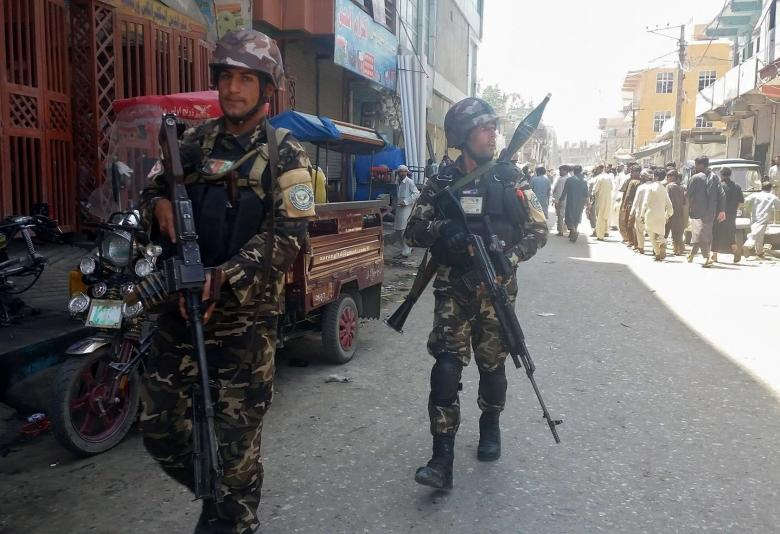News Analysis |
Several gunmen wearing suicide vests have attacked a national television and radio station in the eastern Afghan city of Jalalabad, police have told Al Jazeera.
The attackers, which carried AK-47s, entered Radio Television Afghanistan (RTA) on Wednesday and engaged in a gunbattle with security forces.Two of them detonated their vests, while at least one – possibly two – remained to fight, said the police.
Though no group has, thus far, claimed the responsibility for the attack but given that the attack took place in the capital of Nangarhar, Islamic State’s complicity cannot be ruled out.
According to Al Jazeera, three attackers and many other people have been killed in the raid. The Al Jazeera correspondent further went on to report that 16 people, including media personnel, have been wounded in the attack.
Read more: More troops in Afghanistan: A recap of the Vietnam war?
Though no group has, thus far, claimed the responsibility for the attack but given that the attack took place in the capital of Nangarhar, Islamic State’s complicity cannot be ruled out. It is noteworthy that the US employed the GBU 43 B bomb in the very province against the K faction of the IS last month.
Yet another brazen attack comes on the heels of Taliban’s increasing dominance, which is evident by their control of 58% Afghan territory. The US intelligence brass had also feared that Afghanistan would be in for more trouble in 2017.
Last Thursday, the US Senate Select Committee on Intelligence was presented with a comprehensive Worldwide Threat Assessment Report. The Director of National Intelligence, Daniel Ray Coats, in his statement, expressed his apprehensions about the war in Afghanistan. He predicted a worsening security profile and the increase in the resurgence of the Taliban.
“The overall situation in Afghanistan will very likely continue to deteriorate, even if international support is sustained. Endemic state weaknesses, the government’s political fragility, deficiencies of the Afghan National Security Forces (ANSF).”
– Daniel R Coats
Read more: Pakistan, Afghanistan and the US Joins hands to fight Daesh in the region
Likely effect on US Strategy
The US is all set to pay heed to the demands of General Nicholson, the commander of the US forces in Afghanistan. He asked for an addition of more troops to the current 8,400. The new Pentagon-led strategy is based on inducting 5,000 more troops and ramping up airstrikes. The news making rounds were substantiated by the national security adviser, Gen McMaster, in a briefing at the White House last week.
The adviser said the administration was considering a proposal to send thousands of additional troops to Afghanistan and President Donald Trump would decide when to do so after he returns from his foreign trips later this month.
“And so what we’ll have at the end of the next few weeks here is an opportunity for a much more effective strategy for the problem set in Afghanistan, Pakistan, and the region broadly.”
– General McMaster
The raid today will hasten the process of putting in place the new strategy. If anything, references to Pakistan are important to note. General McMaster was the first high-ranked official to include Pakistan in the proposed policy. Though a troop surge will be seen in Afghanistan, it is Pakistan that will be pressurized through various military and nonmilitary means, to include increased drone operations in FATA.
Read more: General McMaster creates a new worry for Pakistan
There is enough evidence to suggest that using more military might will not dissuade an emboldened Taliban and a nascent IS to stop their activities. A negotiated end is the only plausible way, but it requires the commitment to an Afghan-led peace process.
“Pakistani-based terrorist groups will present a sustained threat to US interests in the region and continue to plan and conduct attacks in India and Afghanistan. The threat to the United States and the West from Pakistani-based terrorist groups will be persistent but diffuse,” said Director National Intelligence Coats.
These statements will strengthen the case of those who propose a Pakistan-centered policy to solve the Afghan conundrum.
All this spells out more trouble in the region. There is enough evidence to suggest that using more military might will not dissuade an emboldened Taliban and a nascent IS to stop their activities. A negotiated end is the only plausible way, but it requires the commitment to an Afghan-led peace process. The US can ill-afford to sever ties with Islamabad in the current situation. With the US fully backing the Kabul-Delhi demands to control an unbridled Pakistan, things do not look good for Afghanistan and Pakistan.














